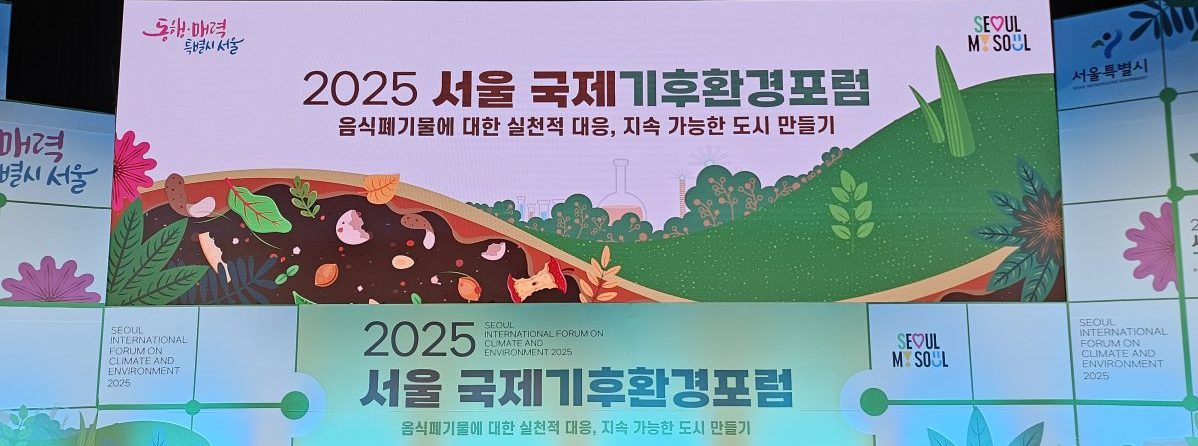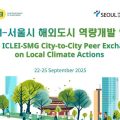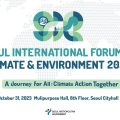Innovative Solutions and Global Collaboration Spotlighted in Fight Against Urban Food Waste


“Hunger today is not caused by lack of food. The world produces enough, but nearly ⅕ of food is lost or wasted every year. Reducing food loss and waste is one of the fastest, most impactful steps we can take to fight hunger,” said Rania Dagash-Karmara, the Assistant Executive Director of the World Food Program, at the 2025 Seoul International Forum on Climate and Environment (SIFCE).
The 2025 SIFCE was held on September 23, bringing together experts, citizens, businesses, and organizations from around the world to address one of the most pressing urban environmental challenges: food waste. Under the theme “Practical Responses to Food Waste and Building Sustainable Cities,” participants shared insights and strategies to reduce waste and promote sustainability in cities.

Why Tackling Food Waste Is Critical for Cities
Food waste is a significant urban challenge with substantial environmental and social implications. According to Rania Dagash-Karmara, food waste alone generates up to 10% of global greenhouse gas emissions, enough to rank as the world’s third largest emitter.
Unmanaged food waste leads to environmental harm and economic loss. When we waste food, we also waste land, water, and energy that are used to produce it. Urban density, heavy consumption, and limited disposal space make efficient solutions essential. Prevention, redistribution, composting, and innovative technologies can help cities reduce waste and build resilience. Coordinated action among governments, communities, and residents is key to success.

Seoul, a bustling metropolis of 9.6 million residents, faces the critical challenge of managing food waste generated daily. Yet, through its Zero Waste Seoul vision, the city has emerged as a global leader in tackling this issue. Its commitment to reducing food waste, expanding recycling efforts, and actively engaging citizens in sustainable urban policies serves as an inspiration worldwide. “Through consistent citizen engagement, Seoul reduced food waste by 25% over the past decade,” said Se-hoon Oh, Mayor of the Seoul Metropolitan Government. “Food waste is now 100% recycled into animal feed, compost, and biogas, avoiding landfills and reducing 280,000 tons of GHG emissions annually.”
Seoul took the lead in food waste separation in 1998, launched a volume-based fee system in 2013, and implemented the RFID (Radio Frequency Identification) system citywide in 2018. RFID-tagged bins allow precise measurement of household food waste, enabling fair disposal charges and encouraging waste reduction. Currently, more than 78% of apartments and multi-family residences use RFID-based systems. Looking ahead, Seoul aims to expand RFID adoption, introduce large-scale waste reducers, and increase biogas conversion to reduce greenhouse gas emissions by 341,000 tons by 2030.
Pooling Global Wisdom to Tackle Food Waste Management Together
For many years, the ICLEI East Asia Secretariat has played a vital role in supporting the Seoul International Forum by bringing together member cities from across the globe. This sustained collaboration fosters a rich exchange of knowledge, allowing participants to not only learn from Seoul’s advanced sustainability practices but also to present and discuss their own innovative solutions for sustainable urban development.
This year, ICLEI invited representatives from four cities—Beijing, Córdoba, Helsingborg, and Quezon City—to showcase innovative strategies for addressing food waste and advancing sustainable food cultures. Shu Zhu, Regional Director of the ICLEI East Asia Secretariat, started the session by emphasizing the crucial role of global collaboration, knowledge exchange, and local leadership in overcoming the complex challenges of food waste.

Shu Zhu, Regional Director of the ICLEI East Asia Secretariat moderated the session
Beijing is a pilot city in China’s Zero Waste Cities initiative, aiming for substantial waste reduction and resource recovery by 2035. The city enforces mandatory waste sorting, invests in food waste treatment technologies, and prioritizes public education and digital monitoring to build lasting waste reduction habits. This integrated approach combines regulations, infrastructure, and community involvement as part of Beijing’s broader circular economy and climate strategy.
Ling Xiao from the Beijing Municipal Ecology and Environment Bureau shared insights on how Beijing addresses food waste. The city has introduced policies to improve waste management in institutions, mobilized society-wide participation, and raised public awareness to encourage changes in household habits.

Ling Xiao, Deputy Director of Solid Waste and Chemicals Management Division, the Beijing Municipal Ecology and Environment Bureau share Beijing’s experience
Located in the center of Argentina, Córdoba is emerging as a leader in circular economy innovation and sustainable food systems in Latin America, hosting global events and implementing advanced waste management strategies. Key local initiatives, such as Fomentando Huertas, promote school and community gardens that connect urban agriculture with food security, nutrition, and composting. By integrating public-private partnerships, educational programs, and urban agriculture, Córdoba encourages sustainable consumption, waste reduction, and active community participation.
Melisa Elizabeth Díaz Acuña from the Municipality of Córdoba emphasized the importance of raising awareness about this issue among the community and its citizens. She also emphasized the importance of close collaboration within City Hall, working with various secretariats to better align policies.

Melisa Elizabeth Díaz Acuña, Director of the Secretariat of Environment and Circular Economy for the Municipality of Córdoba
Sweden’s historical city Helsingborg stands out internationally for its innovative approach to sustainable school meals and food education. The city has introduced climate-smart, plant-forward menus and integrated food literacy into the school curriculum, using kitchens as learning spaces to connect dietary choices with sustainability. These efforts, supported by broader municipal programs and climate goals, have reduced food waste and established Helsingborg as a European leader in shaping sustainable food culture and behaviors.
Mónika Rüll Lundin, Environmental Coordinator for the School and Leisure Administration of Helsingborg, explained that they collaborate with schools and parents to offer food that is more organic and environmentally friendly, while also working to reduce food waste.

Mónika Rüll Lundin, Environmental Coordinator for the School and Leisure Administration of Helsingborg
Quezon City, the most populous city in the Philippines, has emerged as a leader in advancing food waste management and circular economy practices at the local level. The city adopted a Food Waste Management Ordinance to institutionalize policies that reduce landfill dependency while promoting the recovery and redistribution of food. It has established community-based composting hubs, which process biodegradable waste and return compost to urban gardens and farms.
Francis Ian L. Agatep of the Quezon City Climate Change and Environmental Sustainability Department highlighted the city’s efforts to understand consumer behavior, involve the private sector in addressing food waste, and implement policies on green procurement.

Francis Ian L. Agatep. Acting chief of the Quezon City Climate Change and Environmental Sustainability Department
All participants agreed on the need to strengthen collaboration between cities by promoting peer-to-peer exchanges and learning platforms that support the adoption of advanced waste management technologies and policies.
To further promote city-to-city exchange on this topic, Ms. Mónika Rüll Lundin, a speaker at the Forum, also joined a workshop on school food waste reduction held at Jemulpo Middle School in Incheon on September 26. Around 40 participants, including teachers and nutrition staff, attended the event, co-hosted by the Incheon Metropolitan City Office of Education and the ICLEI East Asia Secretariat. The workshop created a practical opportunity for sharing international experience and supporting Incheon’s local efforts on reducing food waste in schools.





